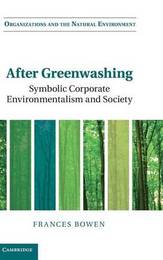
|
After Greenwashing: Symbolic Corporate Environmentalism and Society
Hardback
Main Details
| Title |
After Greenwashing: Symbolic Corporate Environmentalism and Society
|
| Authors and Contributors |
By (author) Frances Bowen
|
| Series | Organizations and the Natural Environment |
|---|
| Physical Properties |
| Format:Hardback | | Pages:310 | | Dimensions(mm): Height 229,Width 152 |
|
| Category/Genre | Business ethics |
|---|
| ISBN/Barcode |
9781107034822
|
| Classifications | Dewey:658.4083 |
|---|
| Audience | | Professional & Vocational | |
|---|
| Illustrations |
11 Tables, black and white; 14 Line drawings, unspecified
|
|
Publishing Details |
| Publisher |
Cambridge University Press
|
| Imprint |
Cambridge University Press
|
| Publication Date |
29 May 2014 |
| Publication Country |
United Kingdom
|
Description
Businesses promote their environmental awareness through green buildings, eco-labels, sustainability reports, industry pledges and clean technologies. When are these symbols wasteful corporate spin, and when do they signal authentic environmental improvements? Based on twenty years of research, three rich case studies, a strong theoretical model and a range of practical applications, this book provides the first systematic analysis of the drivers and consequences of symbolic corporate environmentalism. It addresses the indirect cost of companies' symbolic actions and develops a new concept of the 'social energy penalty' - the cost to society when powerful corporate actors limit the social conversation on environmental problems and their solutions. This thoughtful book develops a set of tools for researchers, regulators and managers to separate useful environmental information from empty corporate spin, and will appeal to researchers and students of corporate responsibility, corporate environmental strategy and sustainable business, as well as environmental practitioners.
Author Biography
Frances Bowen is Professor of Innovation Studies at Queen Mary, University of London. She is a leading authority on when and how companies innovate in response to current and future environmental regulation. She is the 2014 Chair of the Organizations and the Natural Environment (ONE) Division of the Academy of Management, and President-Elect of GRONEN, the Group for Research on Organizations and the Natural Environment.
Reviews'After Greenwashing is the authoritative volume on the drivers and consequences of symbolic corporate environmentalism. It offers a comprehensive analysis of the power of green symbols on society, and valuable tools to distinguish harmful green symbols from those associated with authentic environmental improvements. A must-read for corporate leaders.' Magali Delmas, University of California, Los Angeles 'Greenwash has become so pervasive that consumers are growing jaded about corporate green claims. Yet Frances Bowen offers hope that information technology may soon have greenwash on the run. She offers critical reflections on corporate green symbols (including visual imagery), the role of corporate power, and the possibility that symbolic corporate environmentalism may actually be good for society. Scholars, managers and concerned citizens alike who are interested in ending greenwash will want to read this book.' Thomas P. Lyon, Dow Chair of Sustainable Science, Technology and Policy, University of Michigan 'This volume appears as the world begins to seriously confront the importance of protecting the natural environment, particularly from the effects of increasing warming. Bowen ... provides valuable information for individuals and organizations ... Those involved with government regulation, management of organizational decisions, promotion of environmental health, and student and citizen education will find challenging discussions in the book. Summing up: recommended.' F. Reitman, Choice 'Bowen's After Greenwashing adopts a mix of theoretical, empirical, conceptual and case study approaches to analyse symbolic environmental discourses ... this book complements contemporary social and environmental accounting research seeking praxis for a green society.' Osamuyimen Egbon, Social and Environmental Accountability Journal
|